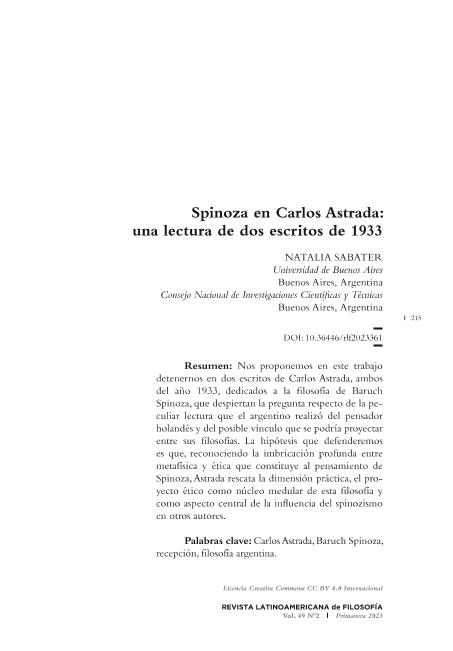Artículo
Nos proponemos en este trabajo detenernos en dos escritos de Carlos Astrada, ambos del año 1933, dedicados a la filosofía de Baruch Spinoza, que despiertan la pregunta respecto de la peculiar lectura que el argentino realizó del pensador holandés y del posible vínculo que se podría proyectar entre sus filosofías. La hipótesis que defenderemos es que, reconociendo la imbricación profunda entre metafísica y ética que constituye al pensamiento de Spinoza, Astrada rescata la dimensión práctica, el proyecto ético como núcleo medular de esta filosofía y como aspecto central de la influencia del spinozismo en otros autores. The following paper addresses two of Carlos Astrada’s writings: both dated from the year 1933, they are dedicated to the philosophy of Baruch Spinoza and become a starting point of further discussion, where questions arise regarding the peculiar reading that Astrada made of the Dutch thinker and the possible link that there could exist between their philosophies.We will defend the hypothesis that recognizing the deep imbrication between metaphysics and ethics that constitutes Spinoza’s thought, Astrada rescues the practical dimension, the ethical project as a fundamental element of this philosophy and as a central aspect of the influence of Spinozism on other authors.
Spinoza en Carlos Astrada: Una lectura de dos escritos de 1933
Título:
The Presence of Spinoza in Carlos Astrada’s Philosophy: Two Writings from 1933
Fecha de publicación:
11/2023
Editorial:
Centro de Investigaciones Filosóficas
Revista:
Revista Latinoamericana de Filosofía
ISSN:
0325-0725
e-ISSN:
1852-7353
Idioma:
Español
Tipo de recurso:
Artículo publicado
Clasificación temática:
Resumen
Palabras clave:
ARGENTINE PHILOSOPHY
,
BARUCH SPINOZA
,
CARLOS ASTRADA
,
RECEPTION
Archivos asociados
Licencia
Identificadores
Colecciones
Articulos(SEDE CENTRAL)
Articulos de SEDE CENTRAL
Articulos de SEDE CENTRAL
Citación
Sabater, Natalia; Spinoza en Carlos Astrada: Una lectura de dos escritos de 1933; Centro de Investigaciones Filosóficas; Revista Latinoamericana de Filosofía; 49; 2; 11-2023; 215-240
Compartir
Altmétricas




